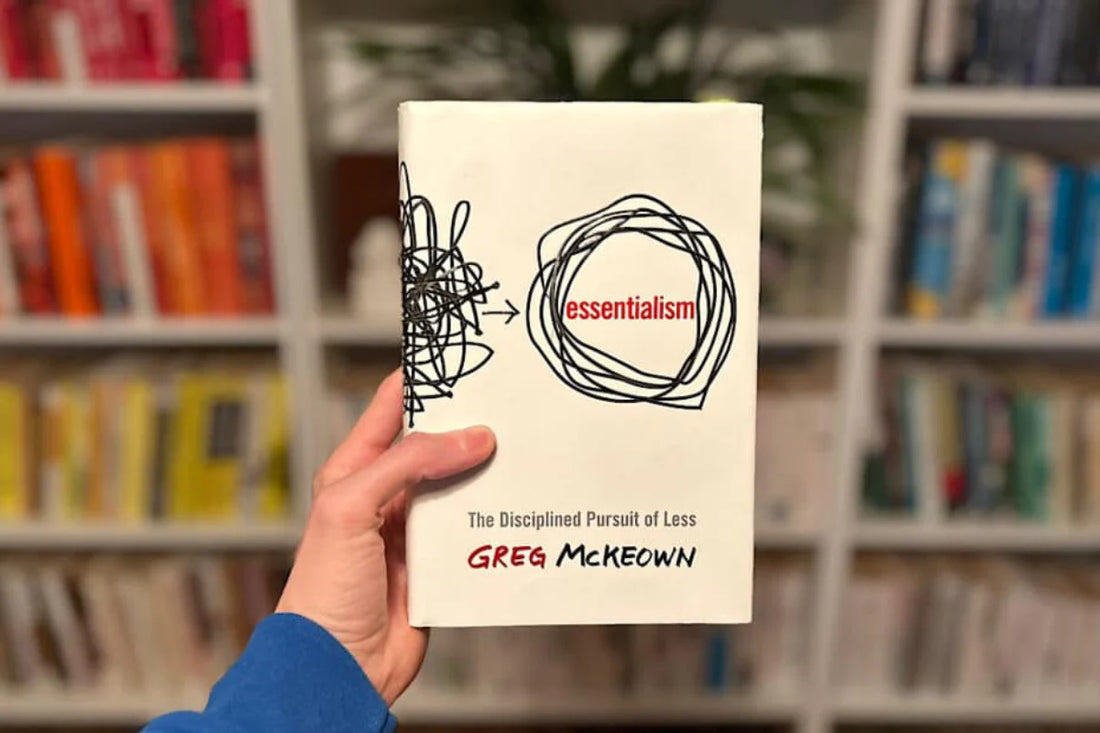Cutting Through the Noise: What “Essentialism” Gets Right (and Wrong)

Share
Why This Essentialism Book Review Matters in Our Overwhelmed World
You've probably felt it too—that crushing weight of endless commitments, the suffocating pressure to say yes to everything. Greg McKeown's "Essentialism: The Disciplined Pursuit of Less" arrives like a life raft in our sea of obligations. But does this productivity manifesto actually deliver on its promises, or is it just another self-help book dressed up in Silicon Valley wisdom?
Let's be honest: McKeown isn't breaking entirely new ground here. The idea that less is more has ancient roots. What he does accomplish, though, is packaging this timeless wisdom for our hyperconnected age. His essentialism philosophy cuts through the noise with surgical precision, asking you to consider a radical proposition: What if the biggest threat to your success isn't failure, but success itself?
Greg McKeown Essentialism Summary: The Core Philosophy
McKeown's central thesis feels almost subversive in our achievement-obsessed culture. He argues that the disciplined pursuit of less isn't about productivity hacks or time management tricks. Instead, it's about making the tough choice between good and great, between urgent and important.
The book unfolds in three parts that mirror a kind of intellectual awakening:
- Essence: Recognizing you have choices and discerning what truly matters
- Eliminate: Cutting out the nonessential with ruthless precision
- Execute: Making execution of the essential as effortless as possible
What strikes you immediately is McKeown's willingness to challenge the very foundations of modern work culture. He doesn't just suggest you should say no more often—he demonstrates why our inability to say no is systematically destroying our capacity for meaningful contribution. This isn't feel-good advice; it's cultural criticism wrapped in practical guidance.
What Are the Main Principles of Essentialism?
McKeown builds his case around several key principles that feel both obvious and revolutionary. The "90 Percent Rule" suggests that unless an opportunity scores 90 out of 100 on your criteria, it's an automatic no. Brutal? Yes. Effective? The Harvard Business Review research he cites suggests it absolutely is.
The concept of "trade-offs" receives particularly sharp treatment. McKeown exposes our collective delusion that we can have it all, do it all, be it all. He argues that the very phrase "I can do both" is often a lie we tell ourselves to avoid making difficult decisions.
Essentialism Key Takeaways: What Actually Works
Here's where McKeown's approach gets interesting—and where this essentialism book review gets complicated. His strategies work, but they require a level of privilege and autonomy that not everyone possesses. The ability to say no to your boss, to turn down lucrative opportunities, to focus solely on your highest contribution—these luxuries aren't available to everyone.
That said, the practical techniques he offers are genuinely transformative:
- The Power of Pause: Building space between stimulus and response
- Uncommit Gracefully: Strategies for backing out of previous commitments
- Edit Ruthlessly: Applying editorial thinking to life decisions
- Protect the Asset: Treating yourself as your most important resource
The chapter on sleep alone is worth the price of admission. McKeown dismantles the toxic culture of sleep deprivation with research from sleep scientists showing that one extra hour of sleep can be worth more than several hours of additional work.
How to Apply Essentialism Principles in Daily Life
The real test of any philosophy isn't in its theoretical elegance but in its practical application. McKeown provides concrete frameworks, but implementing them requires confronting some uncomfortable truths about yourself and your relationships.
His approach to boundary-setting is particularly nuanced. Rather than advocating for aggressive confrontation, he suggests what he calls "graceful nos"—ways to decline that preserve relationships while protecting your essential work. The psychological research supporting this approach is compelling.
The Honest Assessment: Strengths and Limitations
McKeown writes with the confidence of someone who has seen these principles work in high-stakes environments. His consulting work with major corporations provides credibility, but it also reveals the book's primary limitation: it's written primarily for knowledge workers with significant autonomy.
The book succeeds brilliantly at diagnosing our cultural moment. McKeown understands that we're drowning not in a lack of opportunities, but in an abundance of them. His solution—disciplined selection—feels both ancient and urgently contemporary.
Where it stumbles is in acknowledging the structural constraints many people face. Not everyone can simply choose to focus on their "highest point of contribution" when they're working multiple jobs or caring for family members.
Is Essentialism by Greg McKeown Worth Reading?
Despite its limitations, this book offers something rare: a systematic approach to living intentionally in an age of infinite distraction. McKeown's writing is crisp, his examples compelling, and his research solid. The overwhelming positive response from readers suggests he's tapped into something essential about our current moment.
The disciplined pursuit of less isn't just a productivity strategy—it's a form of resistance against a culture that profits from your scattered attention and overcommitment. In that sense, McKeown has written something more subversive than he might have intended: a quiet manifesto for reclaiming your life from the tyranny of more.